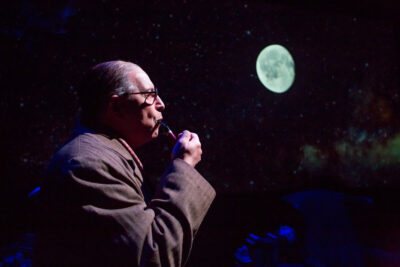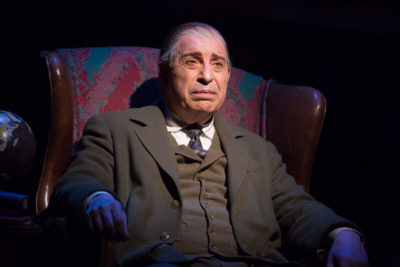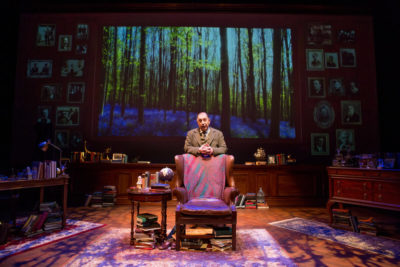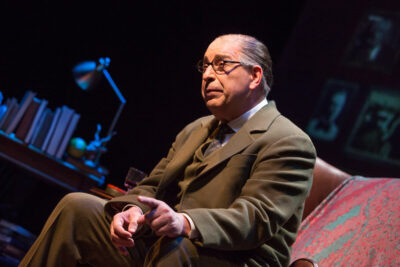NarniaWeb Reviews “The Most Reluctant Convert”
In C.S. Lewis on Stage: The Most Reluctant Convert, Max McLean (writer, performer, co-director) takes the audience on a journey through C.S. Lewis’ early life and his dramatic conversion story. While at times the play can feel a bit heavy, it never turns into a lecture but remains an intense drama about one man’s inner conflict. View the trailer and purchase tickets here.

The play opens with a commentary on pain and “when I was an atheist,” and ends with wonder and the absolute certainty “now I believe,” In between, fans of Lewis’ work will probably recognize many passages as McLean drew on various letters, books, and essays to create an almost seamless tale.
The set is simple, mostly static, and relies on McLean’s admirable performance to fill the stage. The focal points are photographs projected onto the back wall and a comfortable armchair. The photographs showcase various people and authors who influenced Lewis as well as important locations, such as the trenches in WWI, the exterior of Magdalen College, and Addison’s Walk, a place where he had a life-changing conversation with J.R.R. Tolkien. The armchair is where Lewis sometimes relaxes like he is having a companionable chat with the audience, and the lighting is warm and fills the stage. Other times he seems trapped in one place as he describes the absolute presence of a supreme being and the fear that his mind is not alone, and the lighting is cold and focused in a way that feels almost claustrophobic.

Although there is no intermission, the play is neatly divided into chapters with brief pauses in between. Most of these sections are spent describing the various teachers and authority figures in Lewis’ life and how they influenced his experience with faith and religion. Some parts are quite humorous, such as the description of his tutor, and when he became friends with Hugo Dyson and Tolkien and frustratingly realized he was surrounding himself with Christians. Other parts are sadder, such as his mother dying of cancer, and the horrors of WWI and realizing his own mortality.
The parts that seemed to resonate most with the audience were the ones where he talks about a deep longing and a search for joy. There are books all over the stage that Lewis interacts with as he talks about how various works influenced him, but one of the most gripping descriptions is the first time he read Phantastes by George MacDonald. The experience “baptized” his imagination, and was “the essential story of my life, the search for an unsatisfied desire, a desire more desirable than any other satisfaction.” Later, he talks about how joy is more than just happiness, and how he found in himself “a desire which no experience in this world could satisfy.”

Even with such moments of intense emotion, the audience is given room to breathe. Some moments are intentionally comedic, like when he says many people think he is a Puritan and then immediately takes a drink from his liquor cabinet. At other moments the audience laughs not because the subject matter is particularly funny, but because the story is sometimes delivered with an almost embarrassed demeanor that holds true to the concept of Lewis being “the most dejected, reluctant convert in all England.”
At first glance, the subject matter seems like it would appeal to only a specific audience, but the play manages to avoid preaching. McLean said in a discussion with the audience afterward that he was “interested in how this piece lands with those of a different worldview.”

Convert ends before Lewis begins writing the Narnia books or meets Joy Davidman, but the Fellowship for Performing Arts will be performing a version of Shadowlands, the love story of Lewis and Davidman, this fall in New York City.






"Other times he seems trapped in one place as he describes the absolute presence of a supreme being and the fear that his mind is not alone, and the lighting is cold and focused in a way that feels almost claustrophobic". – Sounds a bit like how C.S.Lewis arrived at the character of Rilian being tied to his Silver Chair each evening?
A story telling master!